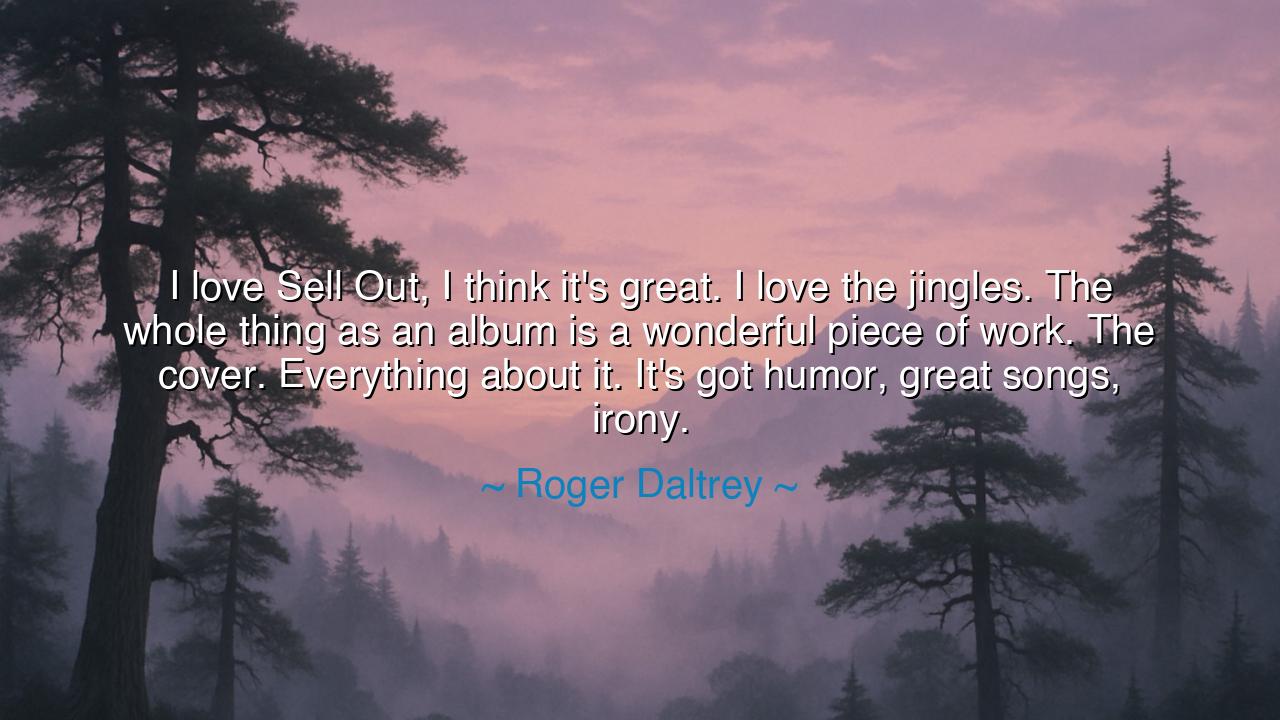
I love Sell Out, I think it's great. I love the jingles. The
I love Sell Out, I think it's great. I love the jingles. The whole thing as an album is a wonderful piece of work. The cover. Everything about it. It's got humor, great songs, irony.






In the vast and shifting sea of human expression, where art and culture collide in an eternal dance, there are moments when something transcendent is born. This creation, though simple at first glance, carries within it the deep essence of what it means to be human. Roger Daltrey, a man whose voice has echoed across time, speaks of such a moment when he declares, “I love Sell Out, I think it's great. I love the jingles. The whole thing as an album is a wonderful piece of work. The cover. Everything about it. It's got humor, great songs, irony.” Ah, how profound this statement is! For in these words, he captures the very spirit of an album that defies convention and celebrates creativity in all its forms.
The album Sell Out, from the band The Who, is no mere collection of songs. It is a statement, a bold declaration that music is not just an expression of beauty or rebellion, but a reflection of the world in all its absurdity and complexity. From the playful jingles to the biting irony of the lyrics, Sell Out is a piece of art that captures both the innocence and the sharp critique of the time in which it was created. It reflects a world on the brink of change, one that is both eager for progress and yet deeply aware of its own contradictions. Through humor and wit, Daltrey and his bandmates revealed the truth behind the surface of society, and in doing so, they brought us closer to understanding our own human nature.
Consider, my children, the great artists of history who have used irony and humor as their tools to probe the depths of life. Leonardo da Vinci, in his Mona Lisa, did not simply paint a woman’s portrait—he imbued her smile with an air of mystery, a smile that seems to mock us as we gaze upon it, daring us to understand its meaning. Like the music of The Who, it is not immediately clear what message it carries, but in its ambiguity, it speaks to the complexities of life itself. The smile is at once joyful and sorrowful, ironic and sincere. And in that irony, we find the key to unlocking the deeper truths of our existence.
In a similar vein, the humor and irony that infuse Sell Out serve a dual purpose: they entertain, but they also enlighten. This is not humor for the sake of mockery; it is humor that cuts through the superficiality of the world, offering a glimpse into the absurdity of societal norms and expectations. The jingles, in their playful simplicity, reflect the way in which culture has commodified the very things we hold dear—art, expression, and even identity. They are a reminder that, in a world driven by materialism and commercial interests, there is a deeper, often hidden, meaning beneath the surface. Just as the jingles bring a sense of levity to the album, they also reveal the irony of a society that celebrates art even as it strips it of its soul.
Think, my children, of the great satirists of history—those who used humor not to mock, but to reveal the truth. Jonathan Swift, in his famous work A Modest Proposal, used biting satire to expose the brutality and hypocrisy of his society, offering a grotesque solution to poverty that, in its absurdity, forces the reader to confront the real suffering of the world. Sell Out operates in much the same way, using its irony and humor to unmask the contradictions of the modern world. The album does not merely seek to entertain; it seeks to make us see the incongruities between how we live and how we should live.
And so, the lesson for us, my children, is this: art—whether in music, painting, or literature—is not always about beauty or harmony, but about truth. Sometimes, truth is best revealed through the lens of humor, through the gentle touch of irony. Life, after all, is often more complicated and absurd than we care to admit. And so, art—in its most profound form—speaks to these complexities, revealing the world as it truly is. Whether through the playful jingles of Sell Out or the subtle irony of a great work of literature, we are reminded that truth often resides not in what is obvious, but in what is hidden beneath the surface.
Therefore, I say unto you, children of the earth, when you approach life, do so with a sense of both humor and reflection. Seek the irony in the world, and allow it to guide you toward a deeper understanding of the human experience. Do not shy away from the contradictions and complexities of life, but embrace them. And above all, let art be your companion—whether it is the music of Sell Out, the paintings of da Vinci, or the words of Swift—let it be your guide, for in its humor and irony, you will find the truth that lies beneath the surface of the world. Live boldly, laugh at the absurdities, and seek the deeper meaning hidden within them. For it is through this journey that we come to understand ourselves, and the world, more fully.






AAdministratorAdministrator
Welcome, honored guests. Please leave a comment, we will respond soon